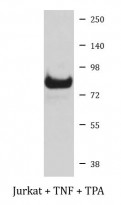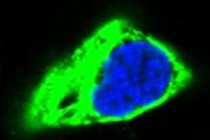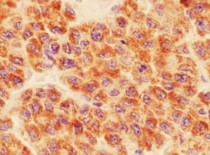ARG40588
anti-TNFAIP3 / A20 antibody
anti-TNFAIP3 / A20 antibody for Flow cytometry,ICC/IF,IHC-Formalin-fixed paraffin-embedded sections,Western blot and Human
Overview
| Product Description | Rabbit Polyclonal antibody recognizes TNFAIP3 / A20 |
|---|---|
| Tested Reactivity | Hu |
| Tested Application | FACS, ICC/IF, IHC-P, WB |
| Host | Rabbit |
| Clonality | Polyclonal |
| Isotype | IgG |
| Target Name | TNFAIP3 / A20 |
| Antigen Species | Human |
| Immunogen | Synthetic peptide derived from Human TNFAIP3. |
| Conjugation | Un-conjugated |
| Alternate Names | A20; OTUD7C; EC 6.3.2.-; Zinc finger protein A20; Tumor necrosis factor alpha-induced protein 3; Putative DNA-binding protein A20; TNFA1P2; OTU domain-containing protein 7C; TNF alpha-induced protein 3; EC 3.4.19.12 |
Application Instructions
| Application Suggestion |
|
||||||||||
|---|---|---|---|---|---|---|---|---|---|---|---|
| Application Note | * The dilutions indicate recommended starting dilutions and the optimal dilutions or concentrations should be determined by the scientist. |
Properties
| Form | Liquid |
|---|---|
| Purification | Affinity purified. |
| Buffer | PBS (pH 7.4), 150 mM NaCl, 0.02% Sodium azide and 50% Glycerol. |
| Preservative | 0.02% Sodium azide |
| Stabilizer | 50% Glycerol |
| Storage Instruction | For continuous use, store undiluted antibody at 2-8°C for up to a week. For long-term storage, aliquot and store at -20°C. Storage in frost free freezers is not recommended. Avoid repeated freeze/thaw cycles. Suggest spin the vial prior to opening. The antibody solution should be gently mixed before use. |
| Note | For laboratory research only, not for drug, diagnostic or other use. |
Bioinformation
| Database Links |
Swiss-port # P21580 Human Tumor necrosis factor alpha-induced protein 3 |
|---|---|
| Gene Symbol | TNFAIP3 |
| Gene Full Name | tumor necrosis factor, alpha-induced protein 3 |
| Background | This gene was identified as a gene whose expression is rapidly induced by the tumor necrosis factor (TNF). The protein encoded by this gene is a zinc finger protein and ubiqitin-editing enzyme, and has been shown to inhibit NF-kappa B activation as well as TNF-mediated apoptosis. The encoded protein, which has both ubiquitin ligase and deubiquitinase activities, is involved in the cytokine-mediated immune and inflammatory responses. Several transcript variants encoding the same protein have been found for this gene. [provided by RefSeq, Jul 2012] |
| Function | Ubiquitin-editing enzyme that contains both ubiquitin ligase and deubiquitinase activities. Involved in immune and inflammatory responses signaled by cytokines, such as TNF-alpha and IL-1 beta, or pathogens via Toll-like receptors (TLRs) through terminating NF-kappa-B activity. Essential component of a ubiquitin-editing protein complex, comprising also RNF11, ITCH and TAX1BP1, that ensures the transient nature of inflammatory signaling pathways. In cooperation with TAX1BP1 promotes disassembly of E2-E3 ubiquitin protein ligase complexes in IL-1R and TNFR-1 pathways; affected are at least E3 ligases TRAF6, TRAF2 and BIRC2, and E2 ubiquitin-conjugating enzymes UBE2N and UBE2D3. In cooperation with TAX1BP1 promotes ubiquitination of UBE2N and proteasomal degradation of UBE2N and UBE2D3. Upon TNF stimulation, deubiquitinates 'Lys-63'-polyubiquitin chains on RIPK1 and catalyzes the formation of 'Lys-48'-polyubiquitin chains. This leads to RIPK1 proteasomal degradation and consequently termination of the TNF- or LPS-mediated activation of NF-kappa-B. Deubiquitinates TRAF6 probably acting on 'Lys-63'-linked polyubiquitin. Upon T-cell receptor (TCR)-mediated T-cell activation, deubiquitinates 'Lys-63'-polyubiquitin chains on MALT1 thereby mediating disassociation of the CBM (CARD11:BCL10:MALT1) and IKK complexes and preventing sustained IKK activation. Deubiquitinates NEMO/IKBKG; the function is facilitated by TNIP1 and leads to inhibition of NF-kappa-B activation. Upon stimulation by bacterial peptidoglycans, probably deubiquitinates RIPK2. Can also inhibit I-kappa-B-kinase (IKK) through a non-catalytic mechanism which involves polyubiquitin; polyubiquitin promotes association with IKBKG and prevents IKK MAP3K7-mediated phosphorylation. Targets TRAF2 for lysosomal degradation. In vitro able to deubiquitinate 'Lys-11'-, 'Lys-48'- and 'Lys-63' polyubiquitin chains. Inhibitor of programmed cell death. Has a role in the function of the lymphoid system. Required for LPS-induced production of proinflammatory cytokines and IFN beta in LPS-tolerized macrophages. [UniProt] |
| Cellular Localization | Cytoplasm. Nucleus. Lysosome. A20p50: Cytoplasm. [UniProt] |
| Calculated MW | 90 kDa |
| PTM | Proteolytically cleaved by MALT1 upon TCR stimulation; disrupts NF-kappa-B inhibitory function and results in increased IL-2 production. It is proposed that only a fraction of TNFAIP3 colocalized with TCR and CBM complex is cleaved, leaving the main TNFAIP3 pool intact. [UniProt] |
Images (3) Click the Picture to Zoom In
-
ARG40588 anti-TNFAIP3 / A20 antibody WB image
Western blot: Jurkat cells treated with TNF + TPA and stained with ARG40588 anti-TNFAIP3 / A20 antibody.
-
ARG40588 anti-TNFAIP3 / A20 antibody ICC/IF image
Immunofluorescence: HeLa cells stained with ARG40588 anti-TNFAIP3 / A20 antibody.
-
ARG40588 anti-TNFAIP3 / A20 antibody IHC-P image
Immunohistochemistry: Paraffin-embedded Human liver cancer tissue stained with ARG40588 anti-TNFAIP3 / A20 antibody.








